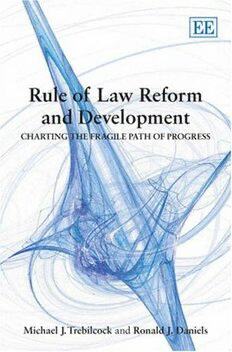
Rule Of Law Reform And Development: Charting the Fragile Path of Progress PDF
380 Pages·2008·1.528 MB·English
Most books are stored in the elastic cloud where traffic is expensive. For this reason, we have a limit on daily download.
Preview Rule Of Law Reform And Development: Charting the Fragile Path of Progress
Description:
This important book addresses a number of key issues regarding the relationship between the rule of law and development. It presents a deep and insightful inquiry into the current orthodoxy that the rule of law is the panacea for the world's problems. The authors chart the precarious progress of law reforms both in overall terms, and in specific policy areas such as the judiciary, the police, tax administration and access to justice, among others. They accept that the rule of law is necessarily tied to the success of development, though propose a set of procedural values to enlighten this institutional approach. The authors also recognise that states face difficulties in implementing this institutional structure and identify the probable impediments, before proposing a rethink of law reform strategies and offering some conclusions about the role of the international community in the rule of law reform.Reviewing the progress in the rule of law reform in developing countries, specifically four regions - Latin America, Africa, Central and Eastern Europe, and Asia - this book makes a significant contribution to the literature. It will be of great interest to scholars and advanced students, as well as practitioners in the field, including international and bilateral aid agencies working on rule of law reform projects; and international and regional non-governmental organizations (NGOs) that focus on rule of law reform as a major aspect of their mandate.
See more
The list of books you might like
Most books are stored in the elastic cloud where traffic is expensive. For this reason, we have a limit on daily download.
